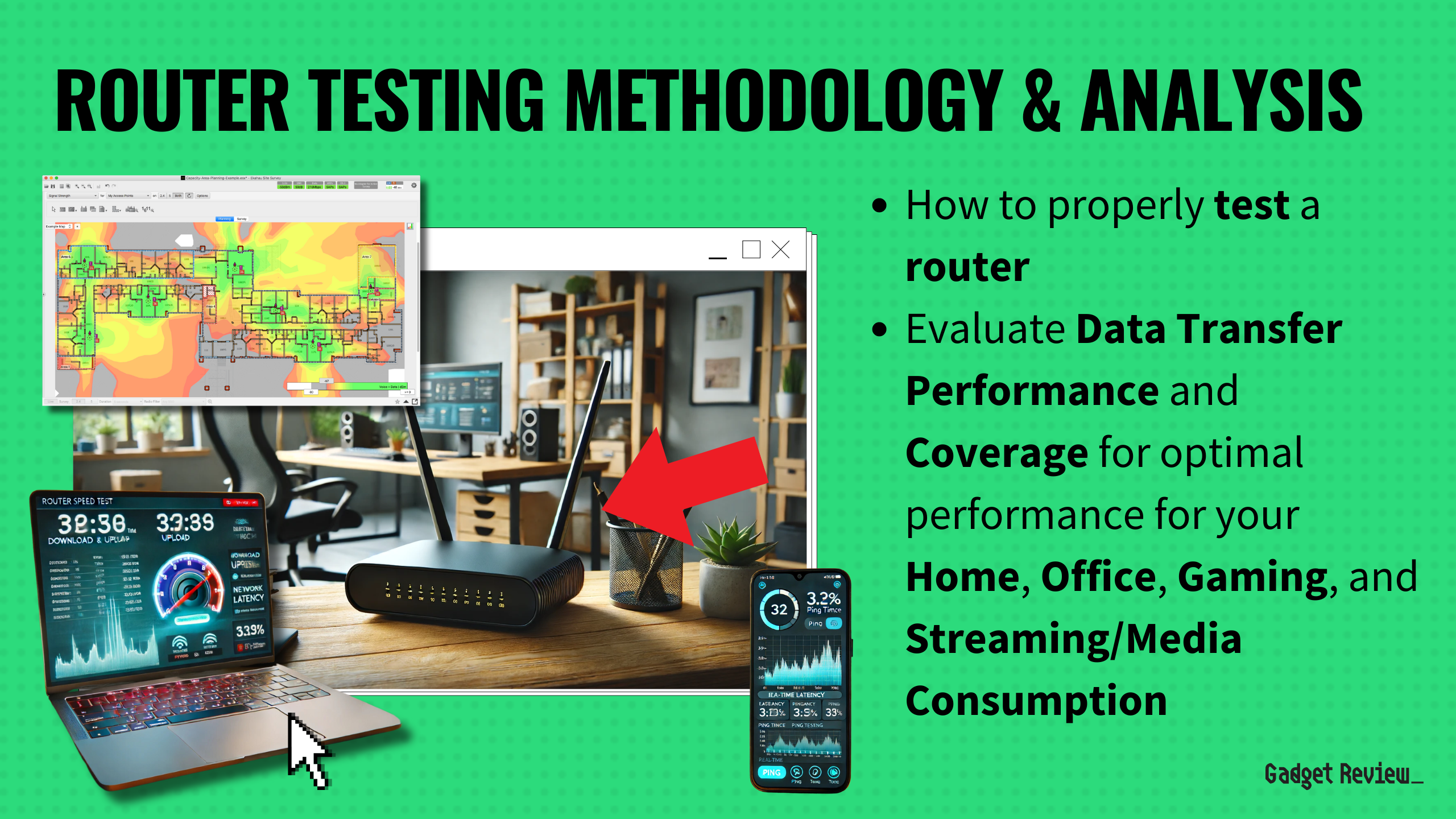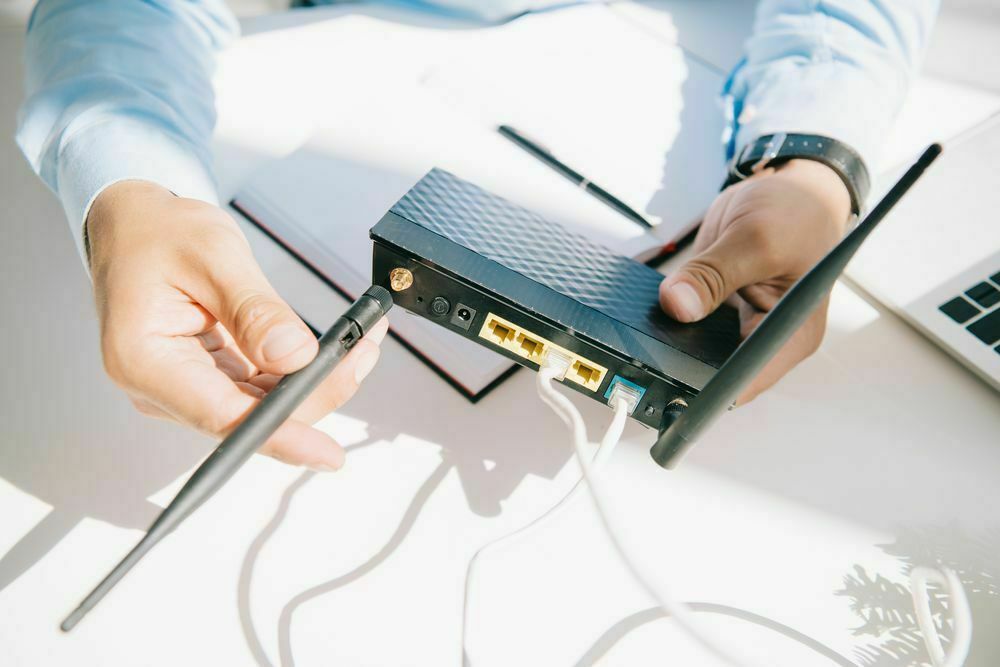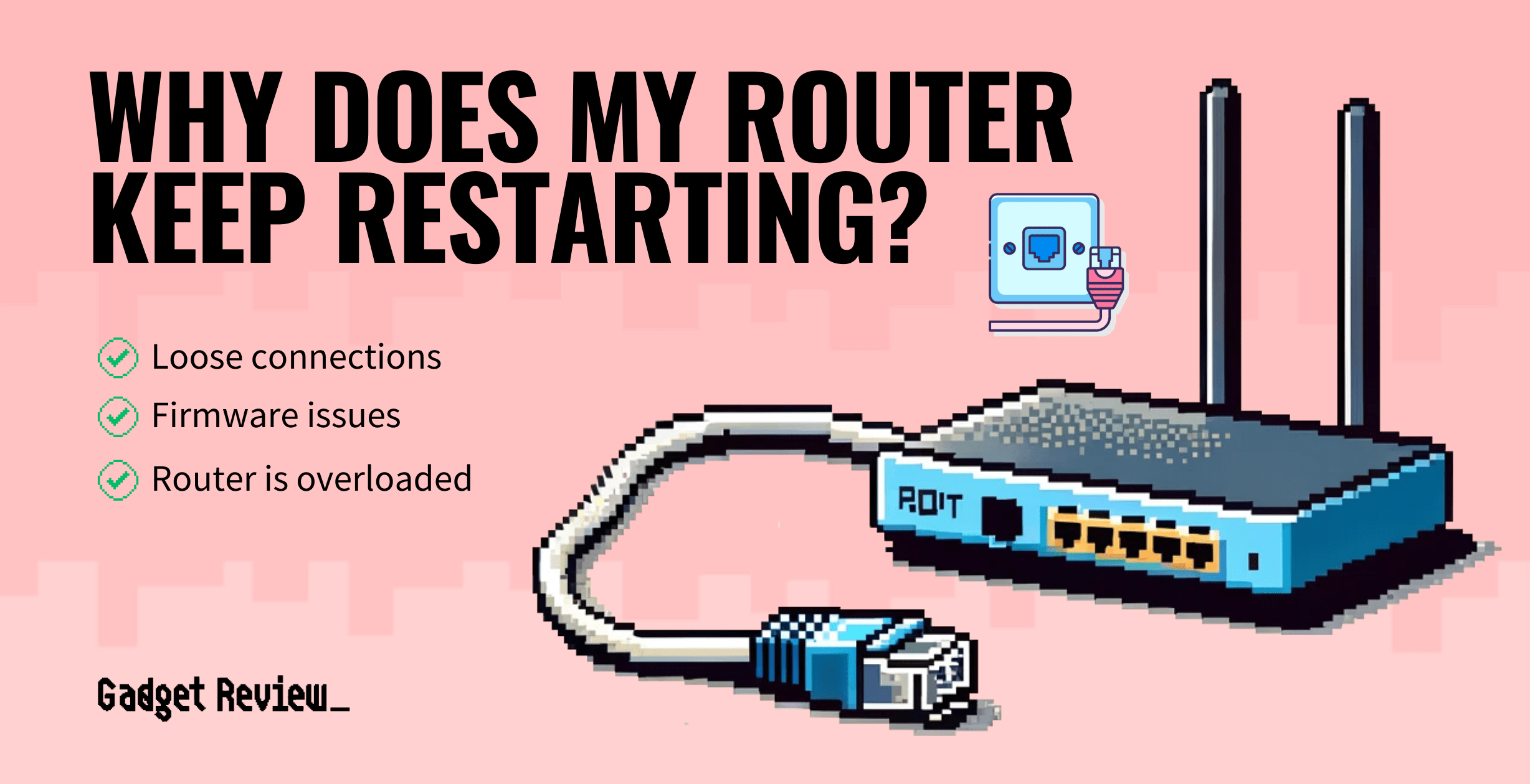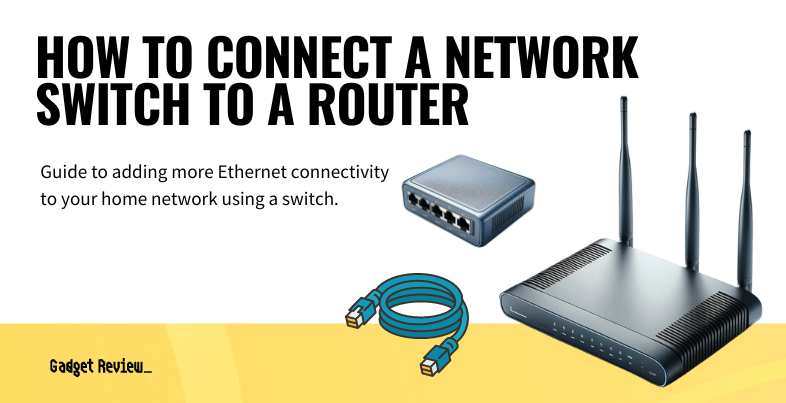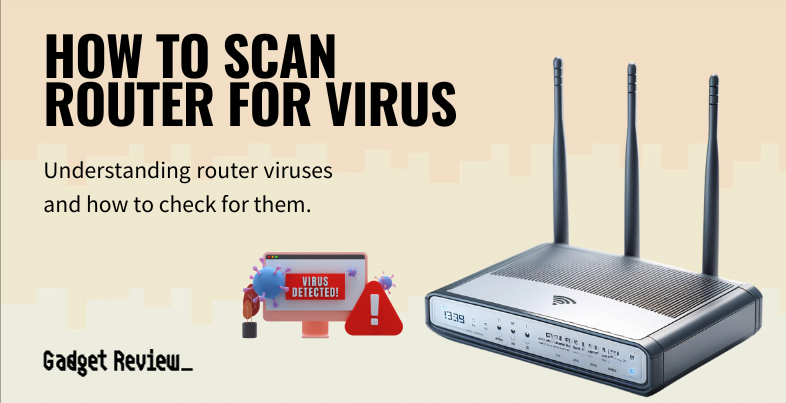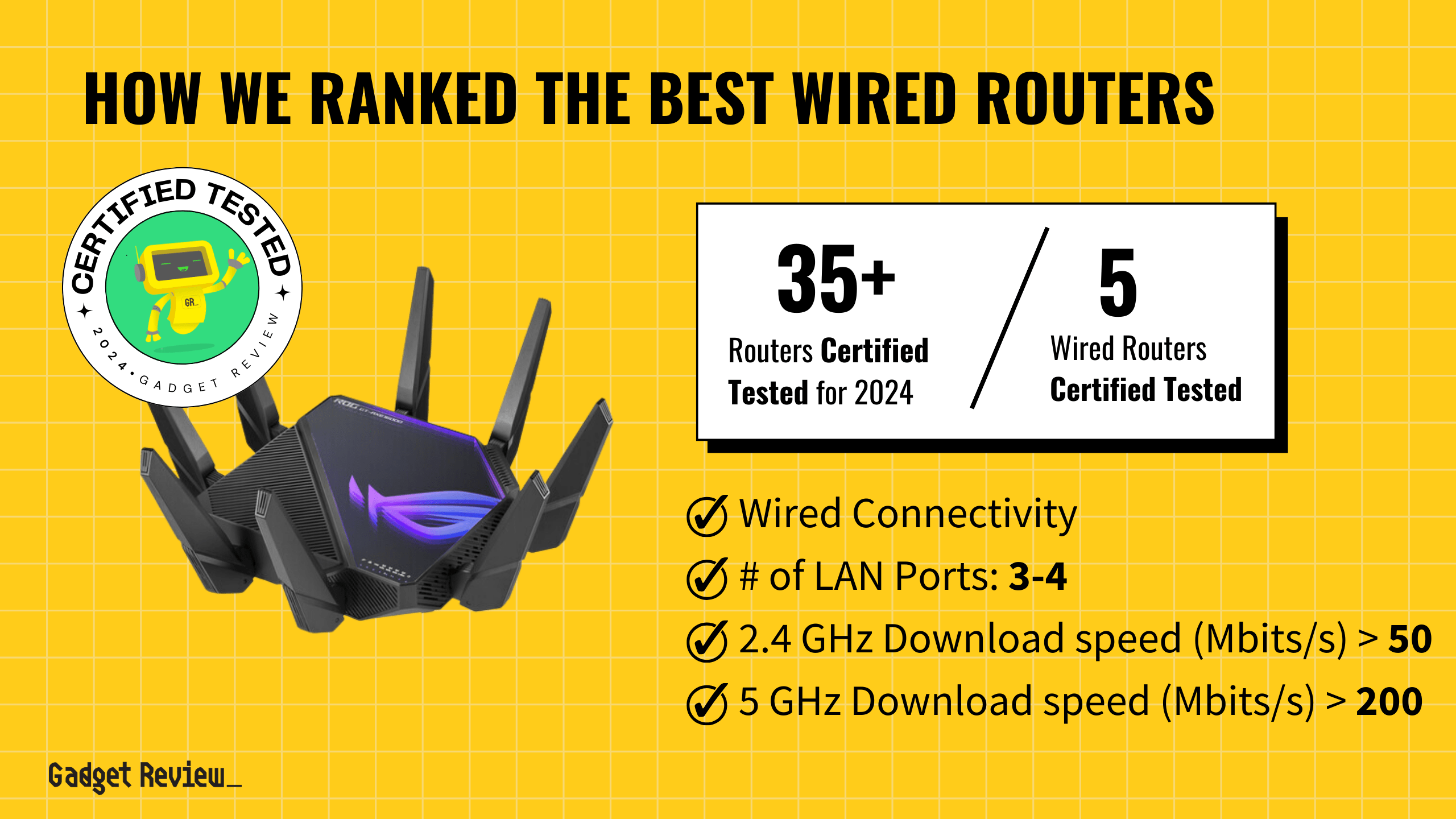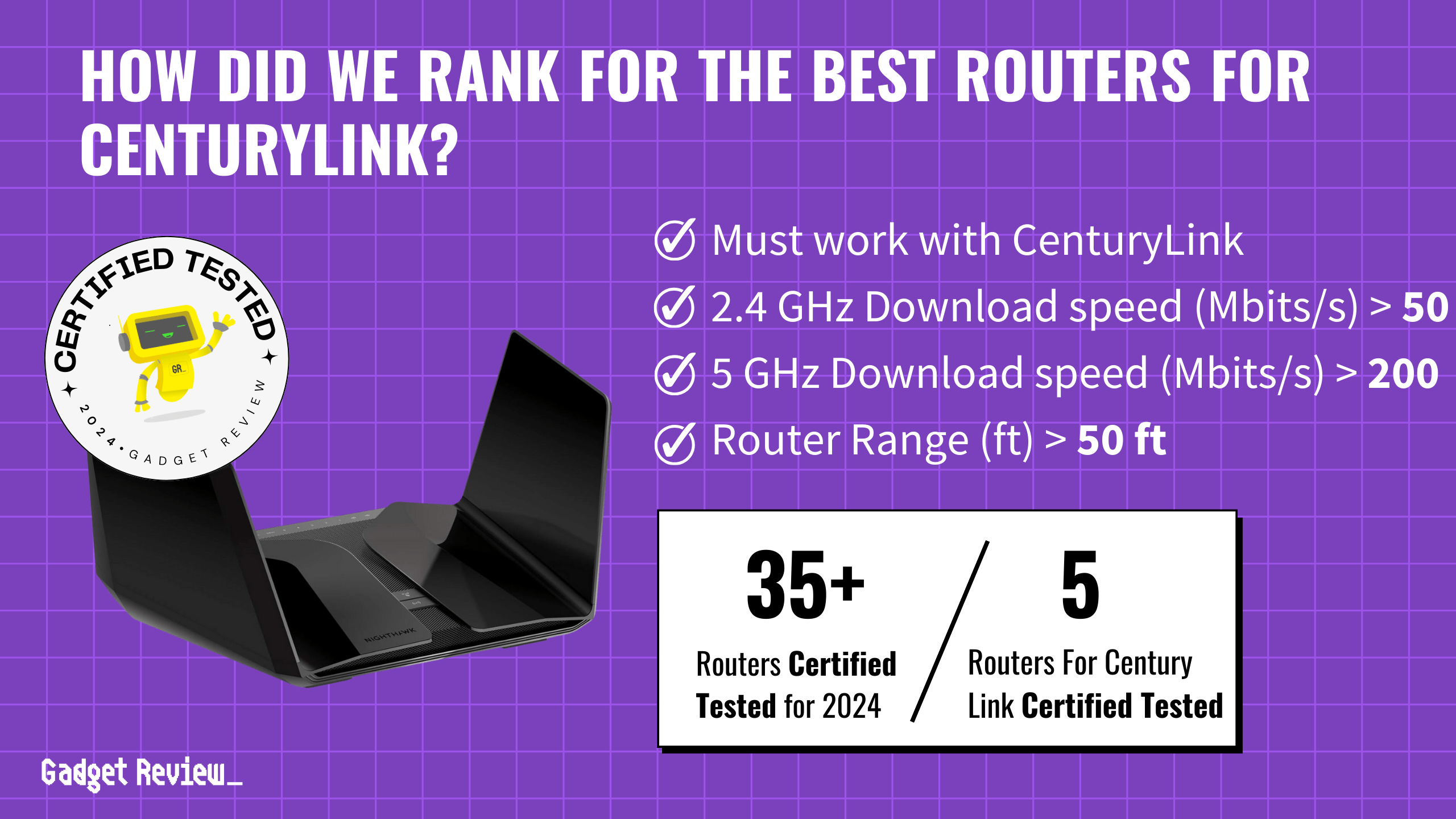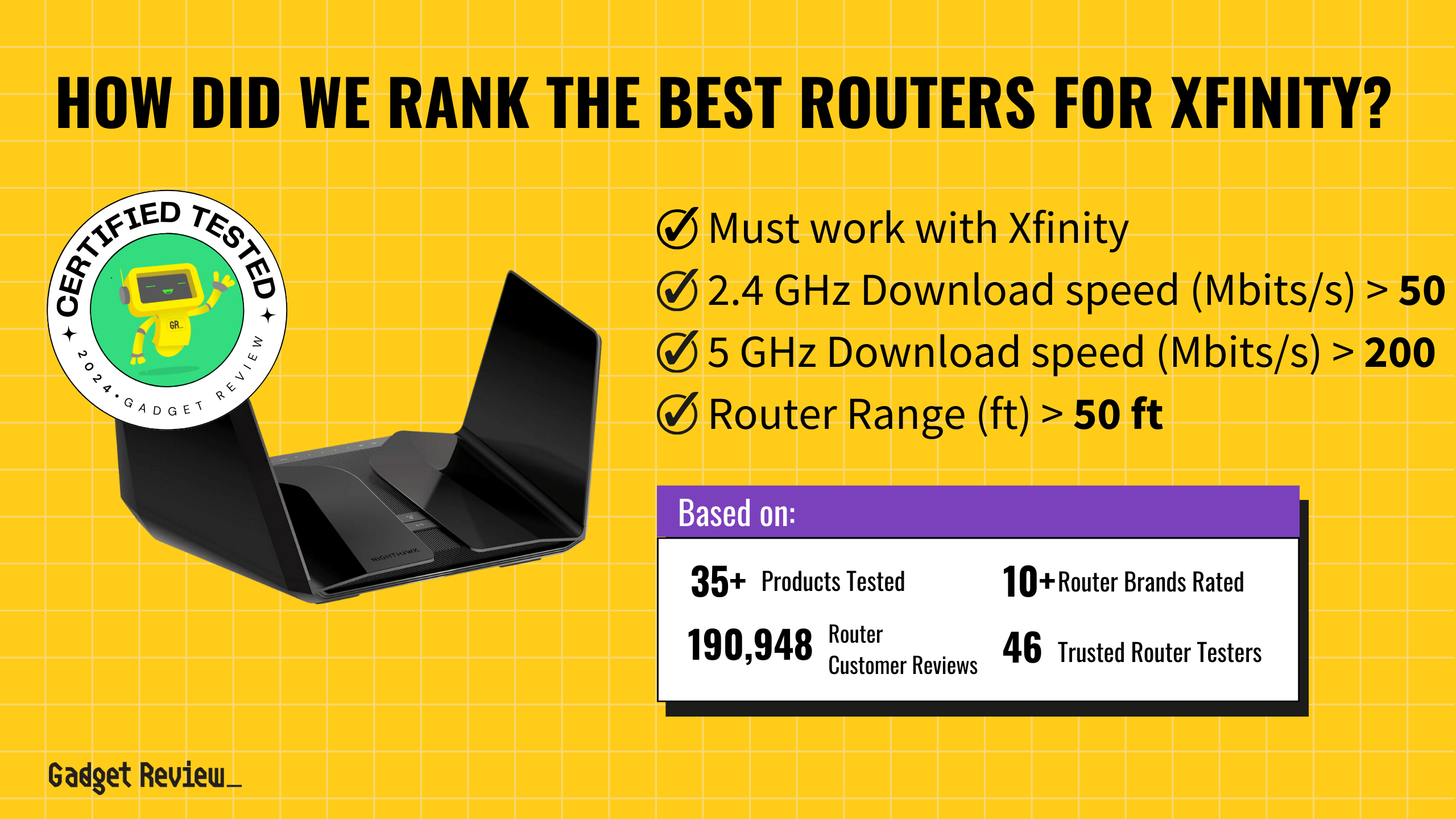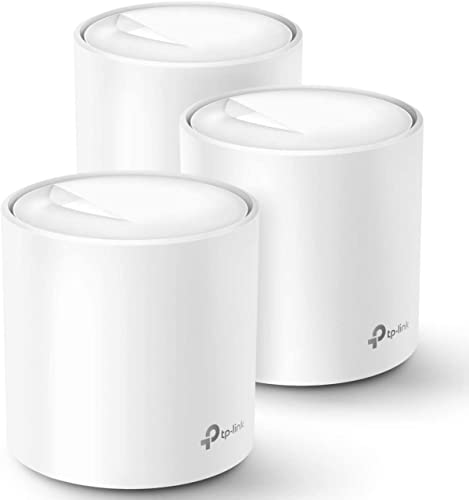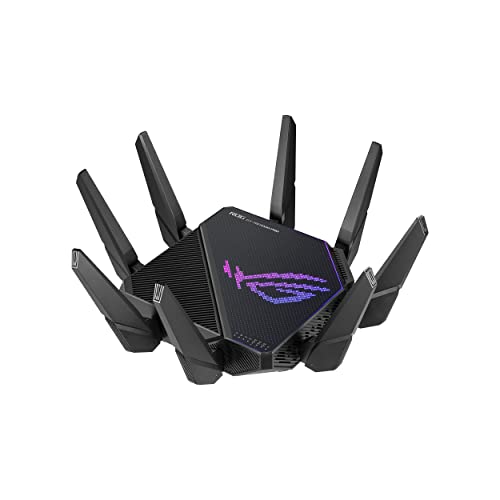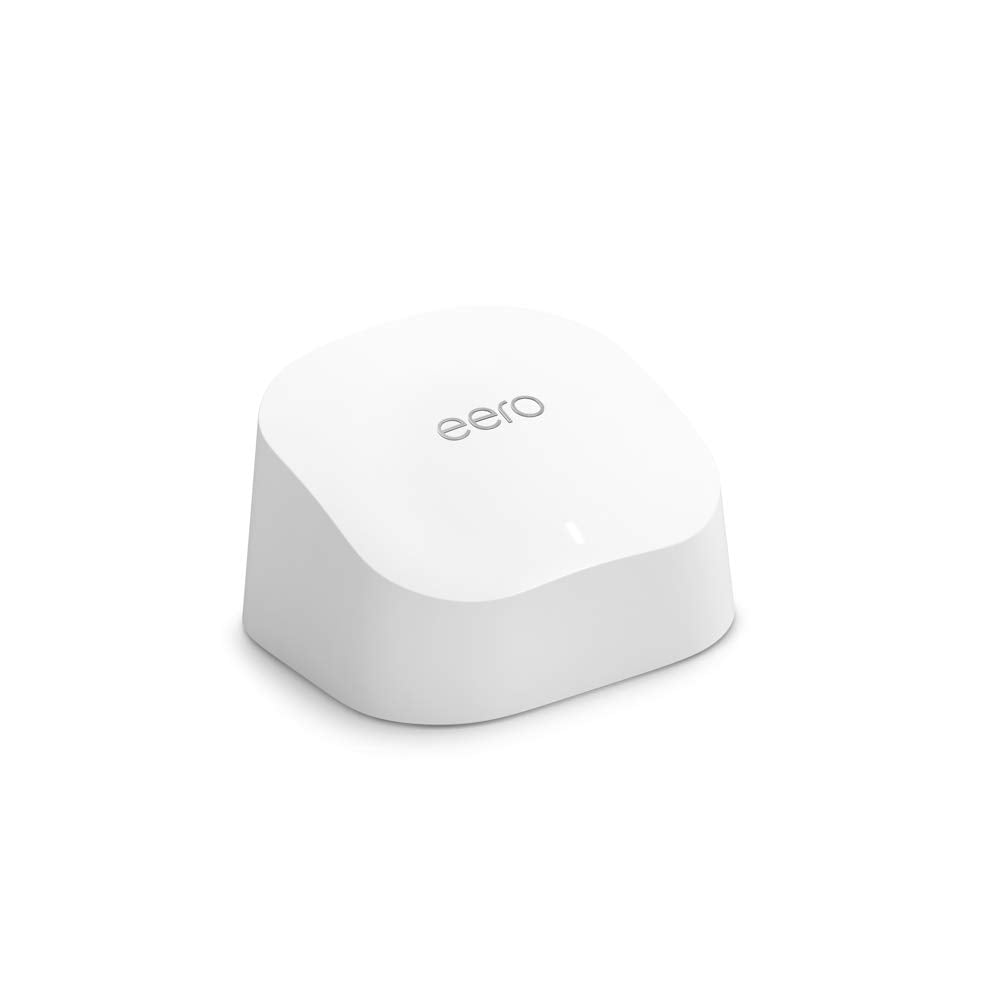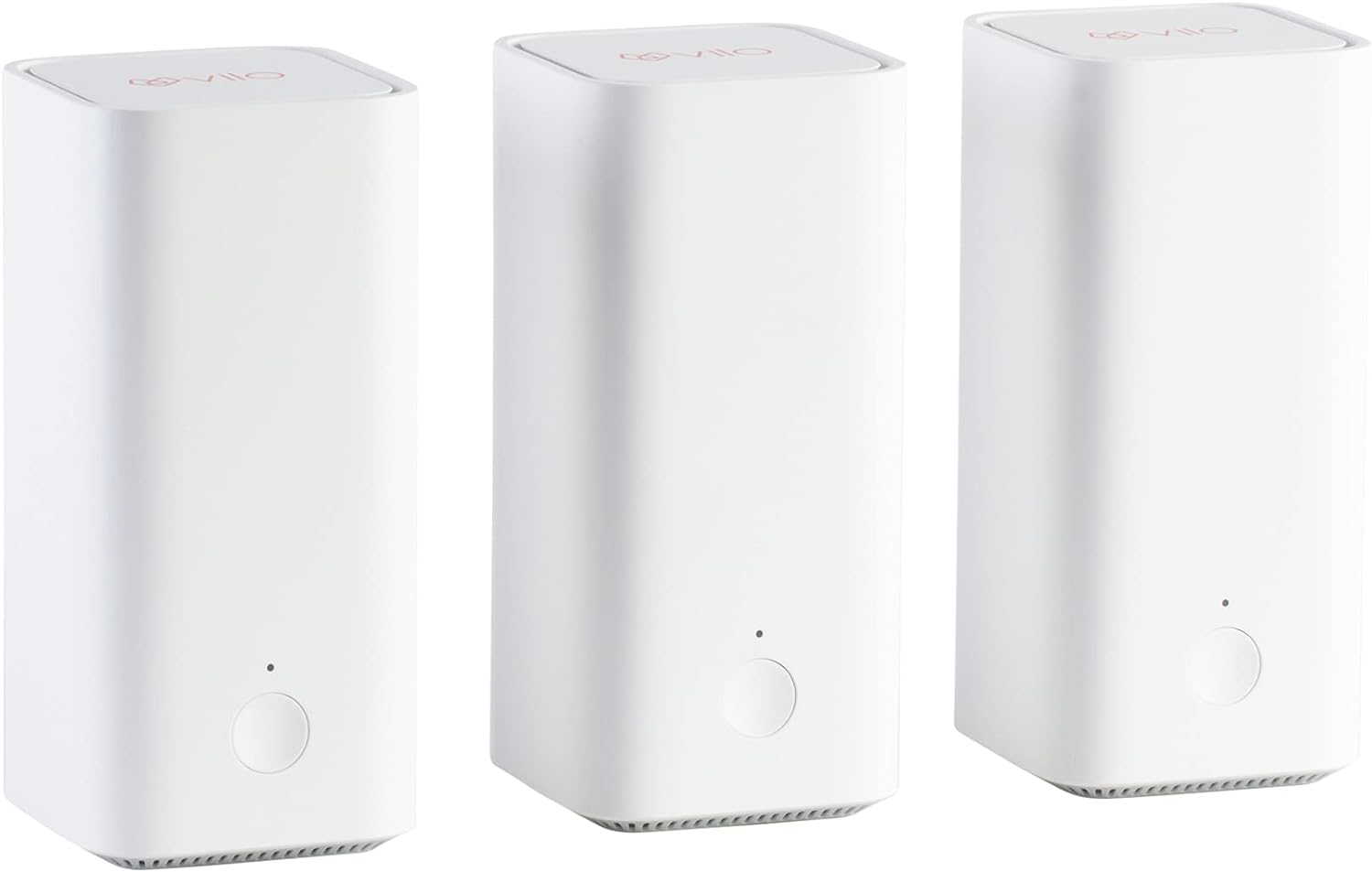When you’re looking for the best VPN router, several key features are crucial. You need a router that supports robust speeds on both 2.4GHz and 5GHz bands, with a minimum download speed of 50 Mbps and 200 Mbps, respectively. Features like onboard VPN support, quality of service (QoS) prioritization, and MU-MIMO are essential for managing multiple simultaneous connections efficiently.
Our guide to the best VPN routers includes five top models that excel in these criteria. We analyzed 30 routers, certified their testing, and evaluated 146,886 expert and customer reviews. Our rigorous process ensures only the best routers made it, filtering out fake reviews with our AI-powered Trust Score. The winning routers demonstrated outstanding performance in reliability, speed, and ease of use.
How Did We Rank the Best VPN Routers?
To compile our buying guide for the best VPN routers, we analyzed over 200 websites. We examined diverse testing methods and scrutinized expert and customer reviews to identify the critical pain points. Our in-depth analysis of expert reviews, combined with our proprietary True Score, helped us determine the most important criteria for VPN routers. We focused on 2 required test results, 2 nice-to-have features, and 1 must-have specification to ensure you get the most reliable and efficient router for your needs.
Our commitment to unbiased reviews is powered by our ‘True Score’ system, targeting low quality and fake reviews. When you shop through our links, you’re backing our mission. Dive deeper to see how.
?️ Minimum Specifications
- Must feature on-board VPN.
? Test Criteria
- 2.4 GHz Download Speed: A download speed on the 2.4 GHz band of at least 50 Mbits.
- 5 GHz Download Speed: A download speed on the 5 GHz band of at least 200 Mbits.
? “Nice To Haves”
- Router Range: A range of at least 50 feet before the signal from the router begins to become noticeably weaker.
- Latency: A latency of 30 ms or less.
Latest Updates
- 06/19/2024: Republished the list to include the best VPN routers based on our True Score system.
Top Vpn Routers For 2025
Prices accurate at the time of publishing

Best Overall

Runner Up

Best Value

Best Budget

Best Mid-Range

Premium Pick
Synology WRX560
Best For Mesh
A solid choice for those prioritizing VPN functionality with its VPN Plus feature, offering web-based clientless management and superior 2.4 GHz and 5 GHz speeds.
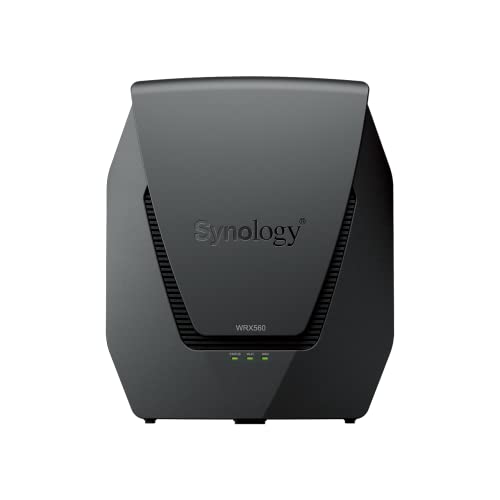
True Score
86886Experts
914kCustomers
Absolutely Fresh
 $219.99
$219.99Read More
Snapshot
Reasons to Buy
- Fast transfer speeds
- Range & Coverage
- Ease of use
Reasons to Avoid
- No USB port for external connectivity
Specifications

# of LAN Ports 3 
Frequency Bands 2.4 GHz, 5.0 GHz 
MU-MIMO Support Yes 
Wireless Standard AX 
Mesh System Yes 
Quality of Service Prioritization Yes 
# of Phone Ports n/a 
# of WAN Ports 1 
App Compatible Yes 
Available Storage n/a 
Band Technology Dual 
Data Encryption Type WPA3 
Energy Star Certified n/a 
Integrated Modem No 
LAN Ports – 
Number of Antennas 6 
Parental Controls Yes 
Processor Cores Quad 
Processor Speed 1.4 GHz 
WiFi Range 5400 sq. ft 
WiFi Speed 3 Gb 
Wired Speed 1000 Mb All Specs
Test Results
2.4 GHz Download speed (Mbits/s) 120 5 GHz Download speed (Mbits/s) 640 6 Ghz Download speed (Mbits/s) 0 Latency (ms) 0 Router Range (ft) 0 2.4 GHz Upload speed (Mbits/s) 97 5 GHz Upload speed (Mbits/s) 635 6 Ghz Upload speed (Mbits/s) 0 All Tests
All Retailers
- $219.99
- $219.99
- $246.64
Our Verdict
The Synology WRX560 offers an attractive blend of privacy-first VPN support and excellent performance. Its 2.4 GHz speeds, with a download rate of 120.42 Mbits/s and upload speed of 96.6 Mbits/s, provide solid performance for secure connections. While not the fastest on every front, these speeds are more than capable of the demands of encrypted data transmission that VPNs require.
The router’s real standout feature is its VPN Plus functionality. This goes beyond standard VPN services by offering advanced options like web-based clientless management and access, simplifying the process for users to connect securely to their network from anywhere. This ease of use and Quality of Service (QoS) prioritization ensures that VPN traffic is managed efficiently, keeping your secure connections smooth and reliable even during high network demand.
Additionally, the WRX560’s performance on the 5 GHz band, hitting a download speed of 640.4 Mbits/s, makes the usual minor hit from using VPN services less of an issue. It’s well-suited for various applications, from streaming high-definition content to ensuring lag-free gaming experiences.
Synology WRX560’s blend of solid performance, enhanced VPN features, and smart network management tools make it a noteworthy option if you prioritize secure, efficient network use. Its VPN Plus feature, in particular, offers a level of convenience and security that is particularly attractive if you’re hoping to enhance your network’s privacy and accessibility or develop tunnels to make remote work more secure.
Read Less

Best Overall

Runner Up

Best Value

Best Budget

Best Mid-Range

Premium Pick
Asus ROG GT-AXE16000
Best For Fiber Optic
Perfect for gamers needing VPN support, with ASUSWRT VPN simplification, top-tier speeds across all bands, and advanced Wi-Fi 6E support for cutting-edge connectivity.
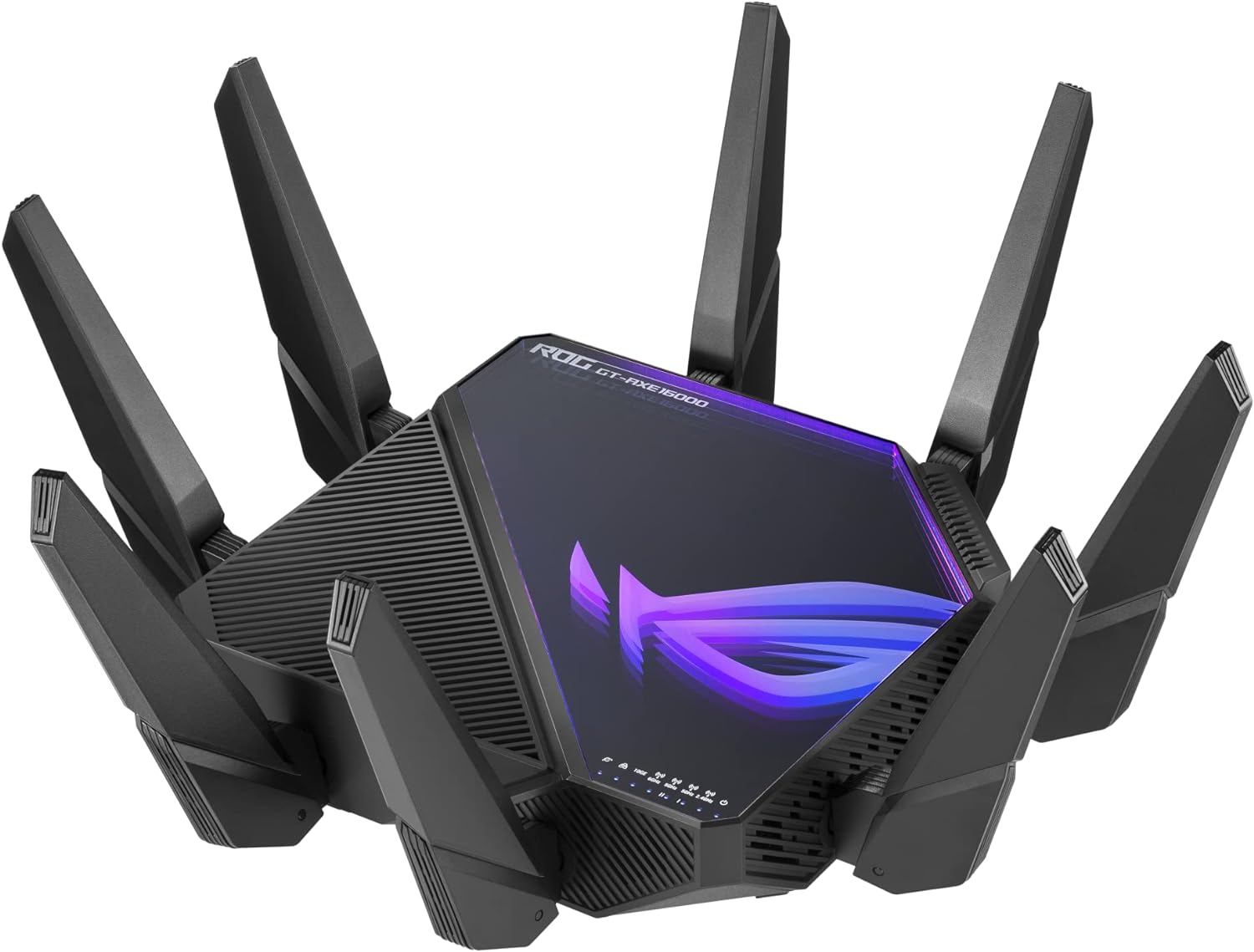
True Score
85865Experts
901kCustomers
Absolutely Fresh
 SAVE $251$699.99$449.00
SAVE $251$699.99$449.00Read More
Snapshot
Reasons to Buy
- Good WiFi Upload/Download Speed
- Easy to Setup and Configure
- Impressive Range of Coverage
Reasons to Avoid
- Poor Latency
Specifications

# of LAN Ports 4 
Frequency Bands 2.4 GHz, 5 GHz-1, 5 GHz-2, 6.0 GHz 
MU-MIMO Support Yes 
Wireless Standard AX 
Mesh System Yes 
Quality of Service Prioritization Yes 
# of Phone Ports n/a 
# of WAN Ports 3 
App Compatible Yes 
Available Storage 256MB 
Band Technology Quad 
Data Encryption Type WPA3 
Energy Star Certified n/a 
Integrated Modem No 
LAN Ports – 
Number of Antennas 8 
Parental Controls Yes 
Processor Cores Quad 
Processor Speed 2 Ghz 
WiFi Range 8000 sq.ft 
WiFi Speed 16Gb 
Wired Speed 1000 Mb All Specs
Test Results
2.4 GHz Download speed (Mbits/s) 113 5 GHz Download speed (Mbits/s) 639 6 Ghz Download speed (Mbits/s) 615 Latency (ms) 69 Router Range (ft) 0 2.4 GHz Upload speed (Mbits/s) 154 5 GHz Upload speed (Mbits/s) 790 6 Ghz Upload speed (Mbits/s) 790 All Tests
All Retailers
- $449.00$700Save $251
- $449.99$600Save $150
Our Verdict
If you’re looking for a premium VPN-ready router that handles gaming easily, the Asus ROG GT-AXE16000 can do both. With a 2.4 GHz download speed of 112.88 Mbits/s and a 5 GHz download speed of 639.1 Mbits/s, it demonstrates robust performance across the board. Additionally, its support for the 6 GHz band and its download speed of 615.2 Mbits/s make it a fantastic choice for the latest in high-bandwidth gaming and streaming demands.
The inclusion of ASUSWRT VPN means that the router offers a user-friendly interface that simplifies the setup and management of VPN connections, ensuring that your online activities are encrypted and secure without sacrificing speed. This is particularly valuable for gamers and streamers who require a stable and secure connection to prevent DDoS attacks or protect their online privacy without impacting the latency or performance of their connections or if you need a secure tunnel to connect remotely to a location for work.
Moreover, the GT-AXE16000’s exceptional speeds are complemented by its advanced features, such as Wi-Fi 6E support, ensuring it’s equipped to handle the bandwidth-intensive demands of the newest devices and applications. Including Quality of Service (QoS) prioritization guarantees that high-priority traffic like gaming packets gets the fastest route through the network, minimizing lag and buffering.
The Asus ROG GT-AXE16000 is expensive, make no mistake. It’s a premium router but also a comprehensive solution for users demanding the best in performance and security. The inclusion of ASUSWRT VPN makes it a great option if you need a router that supports VPN setups out of the box. It offers an easy-to-use, powerful tool for maintaining privacy and protecting against online threats, along with excellent speeds.
Read Less

Best Overall

Runner Up

Best Value

Best Budget

Best Mid-Range

Premium Pick
Netgear Nighthawk RAXE300
Best For Secure
It offers stellar performance and a built-in VPN, ideal for securing multiple devices over its extensive range without sacrificing speed thanks to Wi-Fi 6E support.
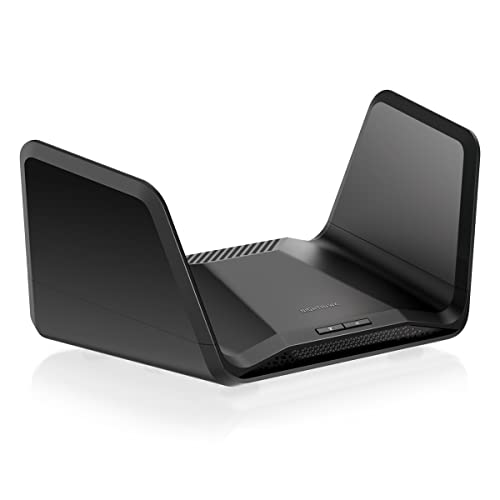
True Score
83829Experts
894kCustomers
Absolutely Fresh
 SAVE $135$299.99$164.99
SAVE $135$299.99$164.99Read More
Snapshot
Reasons to Buy
- Superb Wi-Fi speeds
- Wide range
- Simple setup
Reasons to Avoid
- Limited range (6GHz)
- No USB A port
- Subscription-based security solutions
Specifications

# of LAN Ports 6 
Frequency Bands 2.4 GHz, 5.0 GHz, 6.0 GHz 
MU-MIMO Support Yes 
Wireless Standard AC, AX, N 
Mesh System No 
Quality of Service Prioritization No 
# of Phone Ports 1 
# of WAN Ports 1 
App Compatible Yes 
Available Storage 256MB 
Band Technology Tri 
Data Encryption Type WPA-PSK, WPA2-PSK, WPA3 
Energy Star Certified No 
Integrated Modem No 
LAN Ports 4 Gb Ethernet 
Number of Antennas 6 
Parental Controls Yes 
Processor Cores Quad 
Processor Speed 1.7GHz 
WiFi Range 2500 sq.ft 
WiFi Speed 7.8 Gb 
Wired Speed 1000 Mb All Specs
Test Results
2.4 GHz Download speed (Mbits/s) 222 5 GHz Download speed (Mbits/s) 852 6 Ghz Download speed (Mbits/s) 757 Latency (ms) 5 Router Range (ft) 170 2.4 GHz Upload speed (Mbits/s) 0 5 GHz Upload speed (Mbits/s) 175 6 Ghz Upload speed (Mbits/s) 247 All Tests
All Retailers
- $164.99$300Save $135
- $239.97$400Save $160
- $299.99
- $379.99$399Save $19
Our Verdict
If you’re setting up a VPN network and need to connect multiple devices that are going very far from the router, the Netgear Nighthawk RAXE300 offers an outstanding range of 170 feet. It also boasts best-in-class speeds for both 2.4 and 5 GHz bands, coming in at a staggering 221.65 Mbits/s and 851.6 Mbits/s, respectively.
The built-in VPN support of the Nighthawk RAXE300 provides you with an added layer of security for internet activities. Unlike standard VPN services that require third-party software and complex configuration, the RAXE300 integrates VPN functionality directly into its firmware. This integration allows you to set up and manage your VPN connections directly through the router’s interface, simplifying the process of securing all connected devices in one go.
In addition to its VPN capabilities, the Nighthawk RAXE300 features Wi-Fi 6E support, which enables it to use the 6 GHz band for even less congested and faster connections. With a download speed of 756.8 Mbits/s, it’s exceptionally fast, perfect for helping mitigate the loss of speed you often experience when using VPNs.
Netgear’s Nighthawk RAXE300’s outstanding performance across all of the Wi-Fi bands doesn’t come with an eye-watering price. It’s a surprisingly affordable router with built-in support for VPNs baked right into the firmware, making it an exceptional choice for just about any setting. Whether you need a router for secure tunnels for work, are trying to shield your connection as a streamer, or just want enhanced privacy with sacrificing speeds, it’s a fantastic pick.
Read Less

Best Overall

Runner Up

Best Value

Best Budget

Best Mid-Range

Premium Pick
Asus ROG GT6 Mesh
Best For Streaming
A mesh system with robust VPN support provides extensive coverage and fast speeds across all bands, ideal for large homes needing secure, seamless internet access.

True Score
80826Experts
854kCustomers
Absolutely Fresh
 $456.99
$456.99Read More
Snapshot
Reasons to Buy
- Fast Download/Upload Speed
- Easy to install and operate
Reasons to Avoid
- WiFi speed drops off at long range
- Connection range is limited
- Limited USB Connectivity
- Mediocre Latency
Specifications

# of LAN Ports 3 
Frequency Bands 2.4 GHz, 5.0 GHz 
MU-MIMO Support Yes 
Wireless Standard AC, AX, N 
Mesh System Yes 
Quality of Service Prioritization Yes 
# of Phone Ports n/a 
# of WAN Ports 1 
App Compatible Yes 
Available Storage 256MB 
Band Technology Tri 
Data Encryption Type WEP, WPA-Enterprise, WPA-PSK, WPA2-Enterprise, WPA3-Personal 
Energy Star Certified No 
Integrated Modem No 
LAN Ports 3 Gb Ethernet 
Number of Antennas 9 
Parental Controls Yes 
Processor Cores Triple 
Processor Speed 1.7GHz 
WiFi Range 5800 sq. ft 
WiFi Speed 2.6 Gb 
Wired Speed 2500 Mb All Specs
Test Results
2.4 GHz Download speed (Mbits/s) 139 5 GHz Download speed (Mbits/s) 701 6 Ghz Download speed (Mbits/s) 0 Latency (ms) 22 Router Range (ft) 95 2.4 GHz Upload speed (Mbits/s) 112 5 GHz Upload speed (Mbits/s) 619 6 Ghz Upload speed (Mbits/s) 0 All Tests
All Retailers
- $456.99
- $479.99
Our Verdict
If you’re looking for a mesh solution with VPN capabilities, the Asus ROG GT6 Mesh system is an excellent way to get an entire house on a single, VPN-ready network. With a 2.4 GHz download speed of 139.35 Mbits/s and a 5 GHz download speed of 701.3 Mbits/s, it’s plenty fast for not only standard connections but will hold up well to the slight loss in speed you experience when connecting to a VPN.
The ROG GT6 Mesh, much like its other ASUS counterparts, is OpenVPN ready and is also compatible with a multitude of other VPN solutions, allowing you to set up a customized VPN solution that best suits your needs, all while retaining the wide-area coverage and convenience of a mesh network, like the elimination of dead zones and excellent, reliable speeds. By using the multiple access points that come in the box, you can take advantage of the 95-foot range to cover a large space and not have to worry about weak signals degrading your speed.
Because it’s a mesh system with multiple access points in the box, the Asus ROG GT6 Mesh is expensive – but it compensates for that high price with excellent performance, outstanding coverage, and its slew of useful on-board features, including QoS, MU-MIMO, and VPN support. combining the extensive coverage of a mesh system with the security benefits of a VPN. For data-hungry homes, gaming setups, large households, or any situation where you need extensive coverage and secure connectivity, the ROG GT6 Mesh is the way to go.
Read Less

Best Overall

Runner Up

Best Value

Best Budget

Best Mid-Range

Premium Pick
TP-Link Archer AX55
It flawlessly balances VPN and standard internet traffic at a great price. It has a user-friendly interface for VPN setup and sufficient speed and range for most homes.
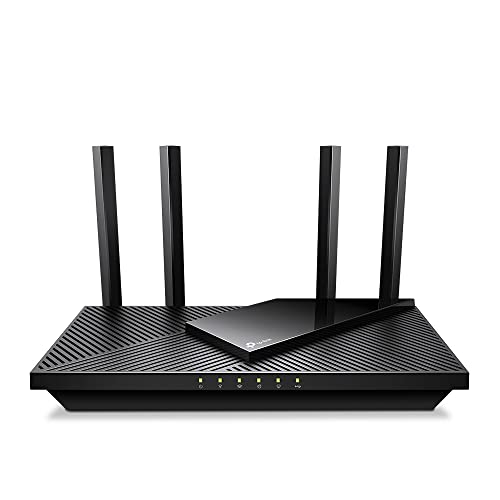
True Score
79793Experts
866kCustomers
Mixed Reviews
 SAVE $221$298.64$77.99
SAVE $221$298.64$77.99Read More
Snapshot
Reasons to Buy
- Good Download/Upload Speed
- Great Connection Range
- Simple Setup and Easy Configuration
Reasons to Avoid
- Slow 2.4 GHz Upload Speed
- High Latency
- Limited Ports
Specifications

# of LAN Ports – 
Frequency Bands – 
MU-MIMO Support – 
Wireless Standard – 
Mesh System – 
Quality of Service Prioritization – 
# of Phone Ports – 
# of WAN Ports – 
App Compatible – 
Available Storage – 
Band Technology – 
Data Encryption Type – 
Energy Star Certified – 
Integrated Modem – 
LAN Ports – 
Number of Antennas – 
Parental Controls – 
Processor Cores – 
Processor Speed – 
WiFi Range – 
WiFi Speed – 
Wired Speed – All Specs
Test Results
2.4 GHz Download speed (Mbits/s) 99 5 GHz Download speed (Mbits/s) 485 6 Ghz Download speed (Mbits/s) 0 Latency (ms) 0 Router Range (ft) 120 2.4 GHz Upload speed (Mbits/s) 54 5 GHz Upload speed (Mbits/s) 745 6 Ghz Upload speed (Mbits/s) 0 All Tests
All Retailers
- $77.99$299Save $221
- $99.00$150Save $51
Our Verdict
The TP-Link Archer AX55 is a versatile router that allows for easy management of VPN and standard connections running simultaneously without sacrificing performance, all at an exceptional price point. Its 2.4 GHz download speed of 98.64 Mbits/s and a 5 GHz download speed of 485.2 Mbits/s ensure it can handle a variety of online activities, from streaming content to engaging in online gaming, without breaking a sweat. With an effective range of at least 120 feet, it also works well in medium and large homes or offices, allowing you to keep devices where you need them instead of moving them closer to the router.
The Archer AX55 also features a user-friendly approach to setting up VPNs. Unlike more complex systems that may require extensive setup, the Archer AX55 simplifies the process, enabling you to easily configure VPN connections directly through the router’s interface. The router can also manage VPN connections alongside standard internet traffic without significant performance degradation. This dual capability ensures that you can enjoy the benefits of a secured network via VPN without compromising on the speed and responsiveness of your internet connection for activities that may not require VPN encryption.
Despite the budget pricing, the TP-Link Archer AX55 is still an excellent performing router, with great speeds and range and its easy-to-use VPN features. It doesn’t support Wi-Fi 6E, which limits its viability in the long-term, but if for a budget-priced model that can handle VPN traffic and standard traffic at the same time without a significant loss in performance, it’s an outstanding option if you’re looking to grab a secure router that’s still fast enough or streaming, gaming or remote work tunneling.
Read Less
Which Criteria Matters for Testing Best VPN Routers?
By focusing on these criteria (2 required and 2 nice-to-have), you can quickly and easily compare routers and assess their performance. This approach helps you make an informed decision and choose a router that meets your needs.
| CRITERIA | RANGE | REQUIRED | DEFINITION |
|---|---|---|---|
| 2.4 GHz Download Speed | > 50 Mbits/s | Yes | The maximum speed that the router can reach when downloading on the 2.4 GHz band. |
| 5 GHz Download Speed | > 200 Mbits/s | Yes | The maximum speed that the router can reach when downloading on the 5 GHz band. |
| Router Range | > 50 ft | No (Nice to have) | How far a device can be from a router before the signal starts degrading. It is worth noting that 2.4 GHz reaches further than 5 GHz. |
| Latency | < 30 ms | No (Nice to have) | The delay that is created by a signal being sent by the router and then received. |
Our Trusted Data Sources
We looked at 120+ router reviewers and found that 46 are trustworthy (60%+ Trust Rating). The three we have listed below are our most trusted for routers.
- James Morris – Kit Guru, LinkedIn
- Matt Spencer – TechGearLab, LinkedIn
- Brian Nadel – Tom’s Guide, MuckRack
Interested in a comprehensive analysis of our data sources? We’ve got you covered. Below, you’ll find a detailed list of every router review website we’ve identified, organized by their respective Trust Ratings from highest to lowest. But we didn’t stop there. We’ve meticulously reviewed each publication and verified the data by checking whether the authors have bio links to MuckRack or LinkedIn. We’re committed to not only checking the facts but ensuring their veracity.
Router Test Data & Results
Disclaimer:
Evaluating router performance is more than hardware analysis. While hardware tests are straightforward, the challenge lies in contextualizing the results within the limits of real-world usage. Routers operate under conditions that testers cannot fully standardize, including variations in Internet Service Providers (ISPs), network traffic congestion, discrepancies between advertised and actual internet speeds, and the physical layout of homes. These factors introduce a degree of unpredictability, making it hard to draw universal conclusions. As such, our router recommendations aim to provide useful general guidance, accommodating a wide range of home environments and internet setups.
1. 2.4 GHz Download Speed (Mbits/s)
The oldest and slowest of the bands on a router is the 2.4 GHz band, but it sticks around for a reason. Generally speaking, while this band features the slowest available speeds and has the lowest bandwidth, but also reaches out the furthest. It’s not the best band to connect to connect if you need high speeds, but if you just need to be connected for light browsing or anything that’s low bandwidth, it works. Alternatively, if you own a lot of old devices, this band may be the only band they can “see” and therefore, use.
Given the age of the band, top speeds on 2.4 GHz cap out very quickly. We recommend a speed of at least 50 Mbits/s, but if you aren’t really going to be using this band for anything other than checking web pages, you can go lower. It’s worth noting, though, that this might lead to a more frustrating and laggier time on modern sites with lots of scripting and high-quality images.
2.4 GHz Download Speed
> 50 Mbits/s
Acceptable range of performance
Definition: The top speed the router reaches downloading on the 2.4 GHz band.
Units of Measurement: Mbits/s (megabits per second)
Tools to Measure: Speed-checking software
Why It’s Important:
For older devices or for connecting at a longer range, the 2.4 GHz frequency is the only one that you’ll be able to use, so it should have usable speed.
2.4 GHz Download Speed (Mbits/s; higher is better; 0 = No Data)
2. 5 GHz Download Speed (Mbits/s)
5 GHz Download Speed
> 200 Mbits/s
Acceptable range of performance
Definition: The top speed the router reaches downloading on the 5 GHz band.
Units of Measurement: Mbits/s (megabits per second)
Tools to Measure: Speed-checking software
Why It’s Important:
This band is used by most modern devices and offers greater speeds that enable activities like gaming and HD streaming on multiple devices.
The much faster 5 GHz band offers up much greater bandwidth and is much, much better at meeting high-speed demands. Streaming high-quality video, using streaming services, gaming, downloading large files and games – the 5 GHz band is what makes all of these activities quick and bearable. It reaches a lower range than the 2.4 GHz band, but it’s also much faster, so you’ll use it more, especially on newer devices that actually support the band.
Given how much you’ll be using this band, we recommend a speed of at least 200 Mbits/s to ensure you’re able to enjoy streaming and gaming on at least a few devices simultaneously. Any lower and you start to run into real bottleneck concerns, such as endless buffering, lagging, or drops in connection.
5 GHz Download Speed (Mbits/s; higher is better; 0 = No Data)
3. Router Range (ft)
Router range is exactly what the name suggests: how far can you get from the router before you start experiencing issues with your connection? The complicating factor is the simple fact that range depends on the band you’re using. 2.4 GHz is a band that offers greater range, so it gives tests results that show a greater range than tests that use the 5 GHz band. In general, our research found most publications used the 5 GHz band, so our recommendations are based on that.
As such, we recommend your router have a range of at least 50 ft. This gives you a good “bubble” around the router that you can connect to, but it’s important to know that things like the walls in your home can cause issues. Thicker walls block more signal, thinner walls block less. Some materials will also do a better job than others will at stopping signal, so if you see a router with a range of 65 ft, know that it might not reach that far in your home. It could reach further – or not nearly as far. This is also why you get dead zones in your home – it’s a matter of geometry and materials.
Router Range
> 50 ft
Acceptable range of performance
Definition: The distance the router transmits reliable signal out to before performance and speed degrades.
Units of Measurement: Feet (ft)
Tools to Measure: Measuring Tape
Why It’s Important:
Range impacts how far you’ll get a reliable connection in your home, and whether you’ll need extenders or not.
Router Range (ft; higher is better; 0 = No Data)
4. Latency (ms)
Latency
< 30 ms
Acceptable range of performance
Definition: The time it takes for the router to send and then receive signals.
Units of Measurement: Milliseconds (ms)
Tools to Measure: Speed-checking software
Why It’s Important:
Latency is important to reduce delay when gaming and video conferencing.
On a router, latency refers to how long it takes for the router to send out and receive a signal. The longer it takes, the more delay there is between you sending and receiving data, which can introduce lag in video games and also makes video conferencing harder since the person you’re speaking with now has to contend with your delay and vice versa. If you’ve ever spent a call talking over someone because you don’t know they started talking a second ago, that’s latency.
For that reason, we recommend a latency below 30 ms. As low as you can get it is obviously preferable, but latency is another aspect of your internet connection that is hard to manage. Latency differs to every single place you connect to, and every ISP has its own latency they “add” because you have to connect to their service too. Latency creeps in from your ISP, from the site you’re requesting data from, from your router, and from your own onboard Wi-Fi antenna – and that’s just to name a few sources. If you’re gaming, you also have a delay introduced by your connection to game servers and the delay that exists on a hardware level when you input commands.
Latency (ms; lower is better; 0 = No Data)
Best VPN Routers: Mistakes To Avoid
- Overlooking the Router’s Processing Power: Choosing a router with insufficient processing power can result in poor VPN performance. Ensure the router has a strong processor to handle encryption and decryption efficiently.
- Neglecting Security Features: Skipping advanced security features can expose your network to risks. Opt for routers with robust security protocols, such as WPA3 encryption, a built-in firewall, and regular firmware updates. Additionally, knowing how to block an IP address from your router can enhance your network’s security by preventing unauthorized access. Consider choosing a router with parental controls to manage and monitor internet usage effectively, ensuring a safer online environment for your family.
- Underestimating Coverage Requirements: Not considering the size and layout of your space can lead to inadequate Wi-Fi coverage. Assess your area and choose a router that provides sufficient range. For larger spaces, consider a mesh Wi-Fi system.
- Disregarding Speed Requirements: Ignoring the impact of a VPN on network speed can lead to slowdowns. Choose a router that can maintain high speeds even when the VPN is active, ensuring smooth performance for all connected devices.
The Best VPN Routers Tests Compared
Product |
True Score
|
2.4 GHz D/L Speed
|
5 Ghz D/L Speed
|
6 GHz D/L Speed
|
Range
|
Latency
| |
|---|---|---|---|---|---|---|---|
| 86 |
|
|
|
|
| $219.99 |
| 85 |
|
|
|
|
| $449.00 $700 $251 |
| 83 |
|
|
|
|
| $205.00 $400 $195 |
| 80 |
|
|
|
|
| $456.99 |
| 79 |
|
|
|
|
| $77.99 $299 $221 |






